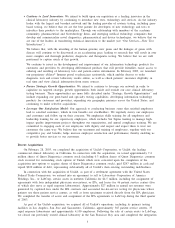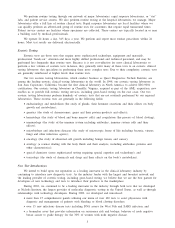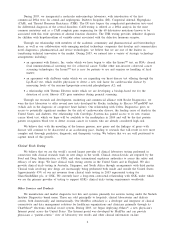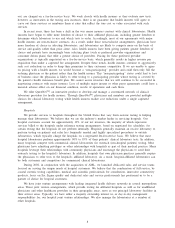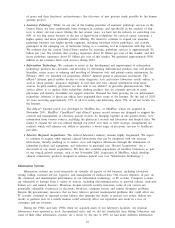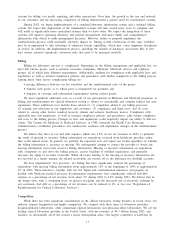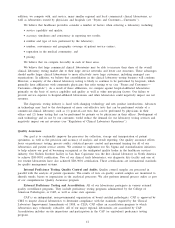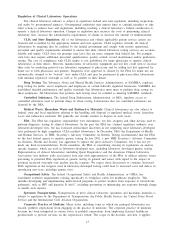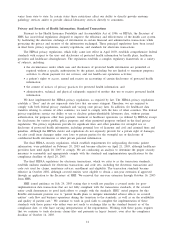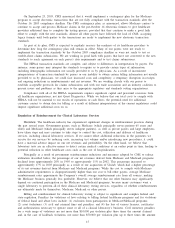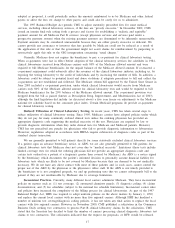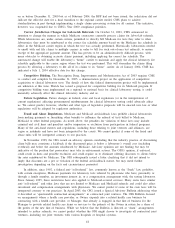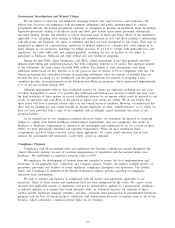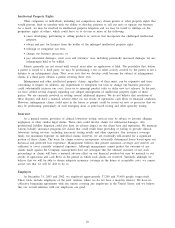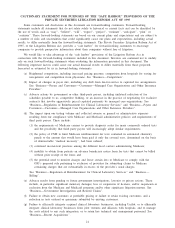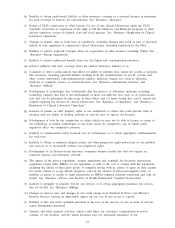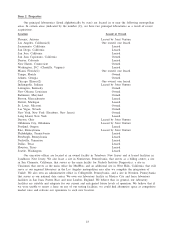Quest Diagnostics 2003 Annual Report Download - page 30
Download and view the complete annual report
Please find page 30 of the 2003 Quest Diagnostics annual report below. You can navigate through the pages in the report by either clicking on the pages listed below, or by using the keyword search tool below to find specific information within the annual report.Regulation of Clinical Laboratory Operations
The clinical laboratory industry is subject to significant federal and state regulation, including inspections
and audits by governmental agencies. Governmental authorities may impose fines or criminal penalties or take
other actions to enforce laws and regulations, including revoking a clinical laboratory’s federal certification to
operate a clinical laboratory operation. Changes in regulation may increase the costs of performing clinical
laboratory tests, increase the administrative requirements of claims or decrease the amount of reimbursement.
CLIA and State Regulation. All of our laboratories and (where applicable) patient service centers are
licensed and accredited by the appropriate federal and state agencies. CLIA regulates virtually all clinical
laboratories by requiring they be certified by the federal government and comply with various operational,
personnel and quality requirements intended to ensure that their clinical laboratory testing services are accurate,
reliable and timely. CLIA does not preempt state laws that are more stringent than federal law. For example,
state laws may require additional personnel qualifications, quality control, record maintenance and/or proficiency
testing. The cost of compliance with CLIA makes it cost prohibitive for many physicians to operate clinical
laboratories in their offices. However, manufacturers of laboratory equipment and test kits could seek to increase
their sales by marketing point-of-care laboratory equipment to physicians and by selling test kits approved for
home use to both physicians and patients. Diagnostic tests approved or cleared by the FDA for home use are
automatically deemed to be “waived’’ tests under CLIA and may be performed in physician office laboratories
with minimal regulatory oversight as well as by patients in their homes.
Drug Testing. The Substance Abuse and Mental Health Services Administration, or SAMHSA, regulates
drug testing for public sector employees and employees of certain federally regulated businesses. SAMHSA has
established detailed performance and quality standards that laboratories must meet to perform drug testing on
these employees. All laboratories that perform such testing must be certified as meeting SAMHSA standards.
Controlled Substances. The federal Drug Enforcement Administration, or DEA, regulates access to
controlled substances used to perform drugs of abuse testing. Laboratories that use controlled substances are
licensed by the DEA.
Medical Waste, Hazardous Waste and Radioactive Materials. Clinical laboratories are also subject to
federal, state and local regulations relating to the handling and disposal of regulated medical waste, hazardous
waste and radioactive materials. We generally use outside vendors to dispose of such waste.
FDA. The FDA has regulatory responsibility over instruments, test kits, reagents and other devices used to
perform diagnostic testing by clinical laboratories. In the past, the FDA has claimed regulatory authority over
laboratory-developed tests, but has exercised enforcement discretion in not regulating most laboratory-developed
tests performed by high complexity CLIA-certified laboratories. In December 2000, the Department of Health
and Human Services, or HHS, Secretary’s Advisory Committee on Genetic Testing recommended that the FDA
be the lead federal agency to regulate genetic testing. In late 2002, a new HHS Secretary’s Advisory Committee
on Genetics, Health and Society was appointed to replace the prior Advisory Committee, but it has not yet
made any final recommendations. In the meantime, the FDA is considering revising its regulations on analyte
specific reagents, which are used in laboratory-developed tests, including laboratory developed genetic testing.
Representatives of clinical laboratories (including Quest Diagnostics) and the American Clinical Laboratory
Association (our industry trade association) have met with representatives of the FDA to address industry issues
pertaining to potential FDA regulation of genetic testing in general and issues with regard to the impact of
potential increased oversight over analyte specific reagents. We expect those discussions to continue. Increased
FDA regulation of the reagents used in laboratory-developed testing could lead to increased costs and delays in
introducing new tests, including genetic tests.
Occupational Safety. The federal Occupational Safety and Health Administration, or OSHA, has
established extensive requirements relating specifically to workplace safety for healthcare employers. This
includes developing and implementing multi-faceted programs to protect workers from exposure to blood-borne
pathogens, such as HIV and hepatitis B and C, including preventing or minimizing any exposure through sharps
or needle stick injuries.
Specimen Transportation. Transportation of most clinical laboratory specimens and hazardous materials is
subject to regulation by the Department of Transportation, the Public Health Service, the United States Postal
Service and the International Civil Aviation Organization.
Corporate Practice of Medicine. Many states, including some in which our principal laboratories are
located, prohibit corporations from engaging in the practice of medicine. The corporate practice of medicine
doctrine has been interpreted in certain states to prohibit corporations from employing licensed healthcare
professionals to provide services on the corporation’s behalf. The scope of the doctrine, and how it applies,
13


